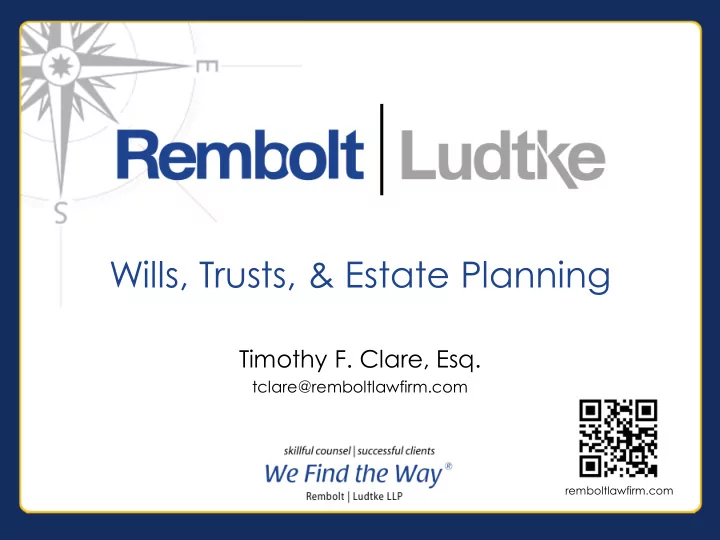

Wills, Trusts, & Estate Planning Timothy F. Clare, Esq. tclare@remboltlawfirm.com remboltlawfirm.com
I. What Is Estate Planning? Means different things to different people – Taxation Issues – Guardian for Child or Children – Passing Assets to Specific Beneficiaries – Probate Avoidance
What Is Estate Planning? Definition: “I want to control my property while I am alive, take care of me and my loved ones if I become disabled, and when I die, I want to give what I have to who I want, the way I want, and when I want, and, if I can, I want to save every last tax dollar, professional fee, and court cost possible.”
II. Why Have An Estate Plan? Avoid Intestacy Laws You direct Asset Distribution Provide for minor children or others in need of a guardian Second Marriage Tax Planning Charitable Giving
3 Steps to Estate Planning… 1. Draft and execute a Will or Will/Trust 2. Title/Beneficiary Designation to Assets A. Some assets pass based on Will or Trust B. Some assets pass based on Title C. Some assets pass based on Beneficiary Designations a) Life Insurance b) Retirement Accounts (IRAs, 401(k)s, etc) c) Annuities 3. Review Use “team” approach
III. Estate Planning Tools For Distributing Assets A. Intestate: a. Easy to put together b. Lots of judicial involvement c. Probate B. Simple Will/Laundry List: a. Relatively easy to put together b. Probate C. Living Trust: a. More complex to put together b. Avoids probate
IV. What Kind Of Estate Plan is Right For Me? It Depends… A.Need to consider for estate tax purposes. B.Need to consider for probate purposes.
V. Estate Tax A. Federal Estate Tax 1. Tax is based on ‘Gross Estate’ 2. Tax rate: 40% 3. Unified Credit $2,000,000 in 2006, 2007, & 2008 $3,500,000 in 2009 N/A in 2010 $5,000,000 in 2011 & 2012 $5,000,000 in 2013 - 2015 (permanent, indexed each year for inflation) $11,180,000 in 2018 $11,400,000 in 2019 $11,580,000 in 2020
V. Estate Tax B. State Estate Tax Repealed
V. Estate Tax C. State Inheritance Tax 1. Tax is based on “Gross Estate” 2. Rate is based on beneficiary’s relationship to decedent
V. Estate Tax D. Gift Tax 1. $15,000/year/donee
VI. Probate Judicial process by which the decedent’s last Will is determined to be the decedent’s final disposition statement. Probate then gathers the decedent’s assets, determines the decedent’s debts and, if legitimate, pays those debts, pays the estate taxes, and then distributes the remaining assets pursuant to the decedent’s final disposition statement (decedent’s Will).
Which assets owned by decedent will go through probate? All assets are probate assets EXCEPT: Joint Tenancy Assets Pay on Death (“POD”) or Transfer on Death (“TOD”) Retirement Accounts Annuities Life Insurance
Probate Considerations 1. Confidentiality 2. Time/Cost 3. Ancillary Probate
VII. Power Of Attorney Documents A. General Durable Power of Attorney B. Health Care Power of Attorney
General Durable Power of Attorney • “An ounce of prevention is worth a pound of cure” • Directive by the principal to the agent of a certain level of authority to perform almost any act the principal could do personally.
Health Care Power of Attorney • “My grandmother started walking five miles a day when she was sixty. She’s now ninety, and we don’t know where she is.” - Ellen DeGeneres • “If I’d have known I was going to live this long, I’d have taken better care of myself.” - George Burns
Health Care Power Of Attorney • Designates another person to make health related decision if principal (patient) is unable to do so.
Questions?
Wills, Trusts, & Estate Planning Timothy F. Clare, Esq tclare@remboltlawfirm.com | Lincoln 402.475.5100 | | Seward 402.643.4770 | | remboltlawfirm.com |
Recommend
More recommend